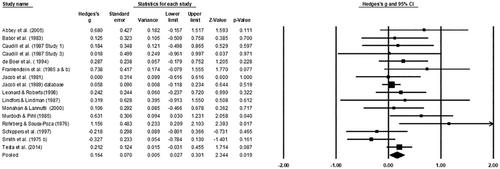Language is a fundamental aspect of human social behavior that is linked to many rewarding social experiences, such as social bonding. Potential effects of alcohol on affiliative language may therefore be an essential feature of alcohol reward and may elucidate pathways through which alcohol is linked to social facilitation. Examinations of alcohol's impact on language content, however, are sparse. Accordingly, this investigation represents the first systematic review and meta-analysis of alcohol's effects on affiliative language. We test the hypothesis that alcohol increases affiliative verbal approach behaviors and discuss future research directions.
PsycInfo and Web of Science were systematically searched in March 2023 according to our preregistered plan. Eligible studies included social alcohol administration experiments in which affiliative verbal language was assessed. We present a random-effects meta-analysis that examines the effect of alcohol compared to control on measures of affiliative verbal behavior.
Our search identified 16 distinct investigations (comprising 961 participants) that examined the effect of alcohol on affiliative verbal behavior. Studies varied greatly in methods and measures. Meta-analytic results demonstrated that alcohol is modestly associated with increases in affiliative verbal behavior (Hedges' g = 0.164, 95% CI [0.027, 0.301], p = 0.019). Study quality was rated using an adapted version of the Quality Assessment Tool for Quantitative Studies and did not significantly moderate alcohol's effects.
This study provides preliminary evidence that alcohol can increase affiliative verbal behaviors. This effect may be an important feature of alcohol reward. Given heterogeneity in study features, low study quality ratings, and limited reporting of effect size data, results simultaneously highlight the promise of this research area and the need for more work. Advances in language processing methodologies that could allow future work to systematically expand upon this finding are discussed.


